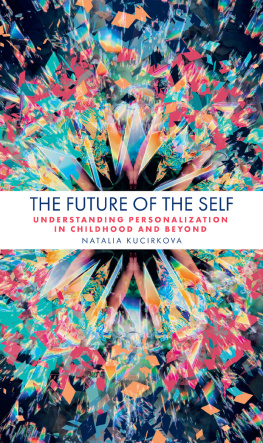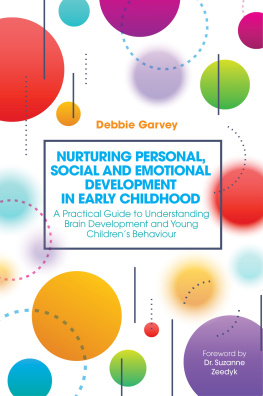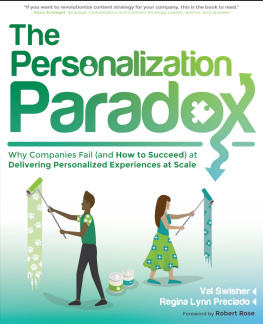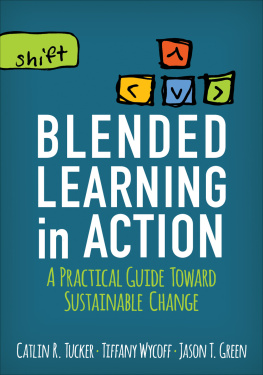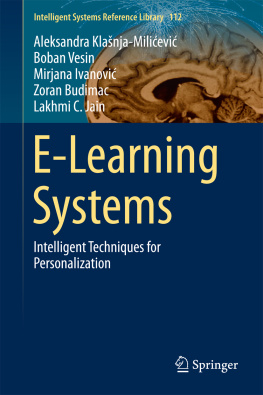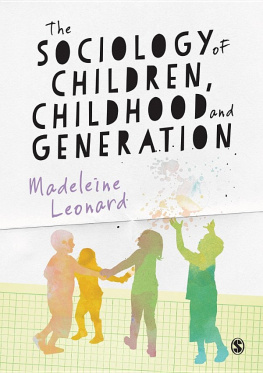PRAISE FOR THE FUTURE OF THE SELF
An astonishing amount of information for educators, other professionals and parents on almost every aspect of technologys impact on childrens development of self and sense of agency. Dr Kucirkova has written a powerful book about the growing impact of technology induced personalization on children and our collective future. The book contains rich information to how children learn that is embedded in context including social science, child development, philosophy and literature. A must read!
Barry Zuckerman MD, Boston University School of Medicine, USA
Anyone concerned about the impact of technology on their life and the lives of children should rush to read The Future of the Self, by Natalia Kucirkova. This book captures the multiple, interacting forces shaping the sense of self in the digital age and encourages readers to reflect on the implications.
The book explores how technologies personalize our experiences using data collected by search engines documenting our activities, educational software guiding our learning, and social media monitoring our interactions.
This book will motivate teachers, parents, designers, policy makers, and users of technology to re-examine the implications of personalization in their lives. Drawing on technological advances, research findings, and theoretical insights Kucirkova identifies trade-offs, dilemmas, and paradoxes that deserve our attention.
The book gives readers tools for thinking about the interacting factors determining how experiences are personalized. In one example, Kucirkova identifies the trade-offs that ensue when balancing personalization targeted to the individual and pluralization targeted to the overall audience. This distinction arises every time teachers make decisions about whether to assign the same book to their class or to let each student select their own book.
Marcia C. Linn, Evelyn Lois Corey Professor of Instructional Science, Graduate School of Education, University of California, Berkeley, USA
THE FUTURE OF THE SELF
Understanding Personalization in Childhood and Beyond
BY
NATALIA KUCIRKOVA
University of Stavanger, Norway and The Open University, UK

United Kingdom North America Japan India
Malaysia China
Emerald Publishing Limited
Howard House, Wagon Lane, Bingley BD16 1WA, UK
First edition 2021
2021 Natalia Kucirkova. Published under exclusive licence by Emerald Publishing Limited.
Reprints and permissions service
Contact:
No part of this book may be reproduced, stored in a retrieval system, transmitted in any form or by any means electronic, mechanical, photocopying, recording or otherwise without either the prior written permission of the publisher or a licence permitting restricted copying issued in the UK by The Copyright Licensing Agency and in the USA by The Copyright Clearance Center. Any opinions expressed in the chapters are those of the authors. Whilst Emerald makes every effort to ensure the quality and accuracy of its content, Emerald makes no representation implied or otherwise, as to the chapters suitability and application and disclaims any warranties, express or implied, to their use.
British Library Cataloguing in Publication Data
A catalogue record for this book is available from the British Library
ISBN: 978-1-80043-945-0 (Print)
ISBN: 978-1-80043-944-3 (Online)
ISBN: 978-1-80043-946-7 (Epub)

CONTENTS
LIST OF FIGURES
ABOUT THE AUTHOR
Natalia Kucirkova is Professor of Early Childhood Education and Development at the University of Stavanger, Norway and Professor of Reading and Childrens Development at The Open University, UK. Her research concerns innovative ways of supporting childrens book reading, digital literacy and exploring the role of personalization in the early years. Her research takes place collaboratively across academia, commercial and third sectors. She is author of Digital Personalization in Early Childhood (Bloomsbury) and How and Why to Read and Create Childrens Digital Books (UCL Press) and currently blogs for Psychology Today.
INTRODUCTION
You and I are the first generation to see children growing up with a paraphernalia of digitized personal data. Childrens fragmented selves begin before they are born with embryo images, and in some cases with recorded genome sequences. The diversity of data that exists on todays children is unprecedented, as are the mechanisms for this data to be deployed for strategic educational, marketing, medical, biological and state-sponsored ends. While with the previous generation the self was unbound, todays generation cultivates inner worlds that are fragmented, with diverse identity markers, such as archived photos, real-time text messages or records of movement, amplified by diverse networks. The Generation Alpha, that is, children born between 2010 and 2025 are the first generation to pioneer digital personalization that significantly fragments and augments their selves. This book provides you with some thinking tools to consider your own contribution to the rising levels of fragmented and amplified selves.
In the first decade of the twenty-first century, the personal data economy enabled personalization to grow from a cheap manufacture model to a highly sophisticated practice. The technological know-how of the personal data economy, however, has accelerated faster than general understanding of what constitutes self. I want to challenge the technological representation of self which currently dominates debates about personalization and focus on the mechanisms of personalization that can inform a comprehensive theory. In this theory of personalization, the basic unit is choice we are who we are because of the choices we make. Choices communicate our identities and, therefore, the practice central to the study of personalization is identity. Education scholars, including myself, understand identity as a verb, as an action that is performed in dialogue with others. It follows that personalization is both a noun and a verb. Simply defined, personalization is a nexus of products, services and practices tailored to one human being.
Personalization is undeniable when we think about our everyday modern lives. Personalized education, personalized news, personalized medicine, personalized gifts the adjective personalized changes the meanings of the nouns it qualifies. There are different conceptualizations of personalization in different contexts. To some, personalization is simply tracking an individuals behavior with adaptive technology, to others it is about empowering young children to explore and be creative. Whether we frame personalization in a deficit or opportunity frame, personalization by its very nature speaks to the personal in an individual human being. In education, attention to the individual child can motivate students to learn. In commerce, personalization can persuade customers to buy a product or to be hooked on a pointless game. Contextualizing activities as your journey, your story or your education affects how you perceive their value, and how much attention, intrinsic motivation and material resources you allocate to them. This is why personalization techniques are of great interest to designers, psychologists and educationalists for decades.

